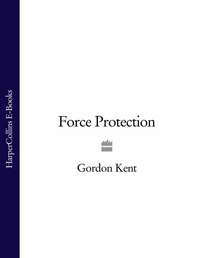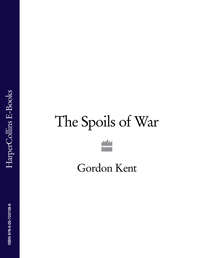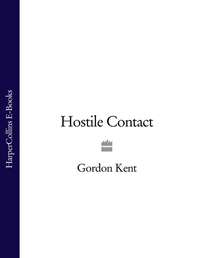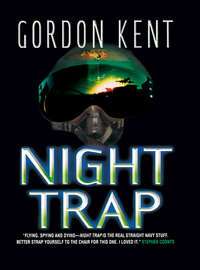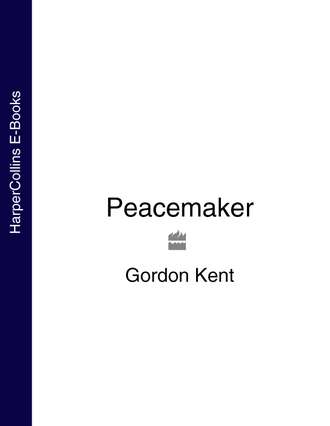
Полная версия
Peacemaker
“In here!” The major sat in a tiny office that had been a toilet before the sinks were ripped out. An unusable commode was almost hidden by a pile of pubs. “Francourt, Major, Canadian army. You know about all that.” He handed over some message traffic: his orders. Alan’s eyes flashed down it—“… temporary duty … CO UNPROFOR/CO IFOR Sarajevo… liaison and intelligence support and acquisition …” What was this shit?
The major was talking again. “You know UNPROFOR, what we do—?”
“I thought you were IFOR.”
The major shook his head. “UNPROFOR. We’re going, they’re coming.” He jerked his head toward the front of the building where the French officer was. “Unfortunately, some of us are still here.”
“Yes, sir.”
“French and Canadians down here, mostly us and the Italians up above.” He looked at Alan. “Tuzla.” That was “up above,” he meant. There had been a lot of fighting. “We were keeping the peace, ha-ha. You know all that. It says here you speak this African Kissy-willy, that right?” He rattled a piece of paper.
“Kiswahili? A little—”
“Good. And Italian, it says. Good, just the guy I want. We got a problem up there, I don’t follow it, but there’s a Kenyan medical unit making a hell of a noise, and I haven’t got time to deal with it. You’ve been asked for. Dick Murch—know him?”
His mind was slow because of no sleep, and it was all coming too fast—Yugoslavia, winter, snow, then all of a sudden Kenyans and Swahili. Murch. “Murch. Yeah—Canadian Army intel—”
“He asked for you by name.” The major rattled the paper again. “Your boss messaged us you’re just the man for the job.” The major, a man with decent feelings, glanced a little unbelievingly at Alan. It would be, after all, a shitty job, whatever it was—cold, uncomfortable, fruitless. Alan saw the major understand that Alan’s boss hated his guts. The major’s voice was almost apologetic: “Well—won’t last long. And it’s just being a good listener, eh? And you can take those photos you brought in right up to Murch and save us a step.”
Well, Alan thought, at least there would be wine with lunch before he left.
“There’s a plane going up in—well, it was supposed to leave a half-hour ago, but they never get out on time. One of yours.” He meant that the US had re-opened the airport at Tuzla and was moving there in a big way. Alan doubted the jab about being late; the Air Force, like the Navy, ran a tight operation. The major was just pissed because he was still here. “Dalembert’ll show you which one.” There went wine with lunch. And lunch, probably. A voice in his head said, This is another fine mess you’ve got us into! The voice would have been Harry O’Neill’s, doing one of his imitations. God, he wished O’Neill was with him! The bond of friendship would have got him through this crap. He and O’Neill had been two first-tour IOs together five years ago, winning the Gulf War on brilliance and brashness (with a little help from some pilots). O’Neill would have known how to deal with Suter. O’Neill would have known how to deal with Alan, for that matter. You’re good, Shweetheart—you’re really good—
“Got a weapon?” the major said.
Weapon. Weapon? Alan had to concentrate. “Got an armpit gun in my pack.”
“Wear it. They’re shooting at us up there. I mean, at us. Take off your rank, anything shiny.” He held up a finger. “Lesson: If you try to help some poor sonofabitch who’s being killed by his brother, they’ll both kill you, instead.” He made a gun with his hands and pretended to squint into a sight.
Alan gave another long, fatigued sigh. He unstrapped the pack and began to feel for the Browning nine-millimeter. This was a fine mess.
Fort MacArthur, North Carolina.
The Georgian brick buildings, the green lawns and the old trees looked like a university campus. The classroom looked like a university classroom. The students, in their thirties and forties, might have been university graduate students. But they weren’t. This was the toughest school in America, with the highest rate of flunkout, dropout, and just plain exhaustion. This was what people inside the intelligence community called the Ranch.
Harry O’Neill sat relaxed at one of the student desks. Unlike the rest, he was attentive to the briefing on Africa. The rest were in body positions that suggested that Africa didn’t exist for them. The teacher, himself a case officer no longer active, was pointing a laser pointer at a map with the outlines of countries but no names and asking questions with the resigned tone of a man who knew that he wouldn’t get answers.
“What’s this?” he snapped. When there was no answer, he said, “O’Neill?”
“Rwanda,” O’Neill murmured.
“This?” Silence. He nodded at Harry. O’Neill said, “Burundi.”
The bright dot moved. The teacher waited, flicked an eye at O’Neill. “Zaire.” Then, “Central African Republic. Chad—”
The teacher snapped the pointer off and leaned his butt back against a table, arms crossed, and said, “Okay, okay. You know what’s going on there? Want to do a little central African brief off the cuff, Mister O’Neill?”
Harry smiled. “Off the cuff, sir, let’s see—two years ago, there was a crash—some folks say a shootdown—of an aircraft with the presidents of Rwanda and Burundi aboard. All hell broke loose, with the two major ethnic groups, the Hutus and the Tutsis, massacring each other. Tutsis came out on top, drove the Hutus into eastern Zaire, where they’re now living in big refugee camps that are being run by their own militias, who got out with their weapons and a big blood lust. When the other shoe drops, there’ll be hell all over again.”
“How come you know all this and the rest of these guys don’t, O’Neill?”
Before Harry could reply, a voice behind him said, low and with a snicker, “Cause dat’s his home, man!”
O’Neill was the only black man in the class.
The teacher snapped erect, face flushed. “All right—who said that—?”
But Harry O’Neill hadn’t stirred. He only smiled and said softly, “Oh, that’s okay, sir. I know who said it.”
When the class ended, most of them stirred and stretched, but a man named Richmond hurried out the door and started down the corridor. Harry O’Neill was just as fast, however; within a few strides, he had caught up and fallen in with the man, draping one arm around the other’s shoulders with what seemed perfect friendliness.
“Richmond, Richmond!” he said. He smiled. He squeezed Richmond’s shoulder. O’Neill had been both a Phi Beta Kappa and a starting defensive end at Harvard; the squeeze had authority. “Richmond, next week we have Close Combat Drill three times, did you know that? And, because I’m near the top of the class, I get to pick my partner, did you know that?” He gave another squeeze. “And Richmond—” His voice took on the same thick, fake-black tone that had been heard in the classroom. “Ah picks yew—man!”
Tuzla.
Alan tried to sleep on the short hop to Tuzla, but it was no good. They’d put him in a “crash-resistant” seat with enough straps to hold back Hulk Hogan, but they hadn’t given any thought to comfort. Most of the huge aircraft was loaded with cargo. The French coffee had lifted him for a little, but that was gone now. He had already had the second surge that comes with real fatigue, the time of being wired, with crash to follow. Except he hadn’t been able to crash. At Tuzla, they made one big turn and went in, with another aircraft on the runway ahead of them and another right behind. Like cyclic ops. Alan tried to find an office for UNPROFOR and finally learned that what was left of it wasn’t at the airfield; it was beyond the city, and he’d need transport. It was like a demonstration of Murphy’s Law. Somebody found him a truck.
The driver was Italian, one of those people who dedicate their lives to not being impressed, so he was not impressed that Alan spoke Italian with a Neapolitan accent. Still, he was willing to talk, so long as it was clear to Alan that he was not impressed by officer rank, either. When they had gone a few kilometers, he stopped.
“Good place to piss,” he said in Italian. “No snipers.” Alan didn’t recognize the Italian word for “snipers” but got it from a pantomime. The second time somebody had pretended to shoot him that day. He got out, and they stood side by side. Lots of other trucks had stopped here for relief; the place was an outdoor toilet, in fact. He climbed back up into the cab, higher than climbing into the old S-3 he had flown in for two years, and they coughed and clanked along. It was an incomparably gloomy scene, as so many land-war scenes are, all dirty snow and mud and artillery damage, and one woman with no teeth and a head scarf and a cow-like stare, watching them go past. Early in the war, a mortar round had landed in a square in Tuzla and killed seventy-one people, most of them children.
The trucker dropped Alan at what had been the UNPROFOR HQ. That was not where Murch was, of course; Murch was in the intel center, in a former school three rubble-strewn blocks away. When Alan had finally humped his pack to the right doorless office, Murch looked at him and said, “Is this the best the States can send us? You look like the meat course in an MRE.”
“I’m wiped.”
“You’ll fit right in.” Murch looked worn out himself. Alan had met Murch a couple of months before down on the coast; they had done a job together and had hit it off. They had found a shared interest in fishing. Murch was convinced there would be fishing nearby when spring came. His only evidence was that Tito had been a fisherman. “Eaten?”
“Somebody gave me a box lunch. I think I ate it. The French were going to give me real food. With wine.”
“You want to be walked through the chow line first or you want to crash?” There were cartons and fiber barrels everywhere. Murch was in the middle of moving.
“I’m running on empty, man.”
Murch handed him a tan plastic cup of acidic coffee and said, “Ten minutes. Got to brief you. Then—” He looked at his watch. “You can get eight hours and you’ll be off.”
“What the hell is ‘off’?”
Murch jerked his thumb toward the sky. “Up the hill. We’ll give you a Humvee and a driver and a gunner. You’re going up on a peacekeeping mission—between the Italians and the Kenyans.”
Thirteen minutes later, he was asleep.
Eastern Zaire.
The air was damp from rain that had come out of season, making haloes around the gas lamps in the cinder-block building. Insects flew in and out of the haloes. Out in the camp, somebody laughed; somebody screamed. Peter Ntarinada, sitting in the building in the scruffy room he called his office, pushed the gift bottle of Glenlivet across the rickety table. “I want more money and I want more arms,” he said.
The Frenchman poured himself some whiskey. He gave a kind of shrug with one eyebrow. “We don’t give something for nothing, Colonel. Lascelles himself said that times are tight.”
“Something for nothing! Look how I’m living! Is this nothing?” Peter snatched the bottle back, poured more into his own glass. “I’m living like a peasant! I live in this fucking camp that is paved with shit because we don’t have toilets—you call that nothing? Anyway, when we get back into Rwanda, you’ll be repaid. Lascelles knows he’ll be repaid. I have a scheme, you see? To move diamonds out of Angola—”
“Yes, yes.” The Frenchman nodded in the way that means, You told me that three times already. “We want you back in Rwanda, Colonel. We want you in the government there. But, we think—Lascelles thinks—in order for us to, mmm, underwrite you again, we need to have, mmm, insurance.”
“Insurance.” Ntarinada, a man at war, didn’t seem to understand the concept of insurance. In fact, he laughed.
“We want to put in a company of real soldiers, Colonel. Oh, I know, I know! Your men are soldiers, yes, yes, they are very good at beating up civilians and fragging people in churches, but frankly, the Tutsis are trained now, and we have intelligence that the Ugandans and the Tanzanians are helping them. So—we need insurance, and you need real soldiers.”
Ntarinada’s face was drawn tight. He licked his lips. “White soldiers, you mean.”
“One company. The best. They’ll go through the Tutsis like a knife, then you come behind. Yes, white. Sorry—it’s the way the world is, Colonel. They have the guns, they have the training, and they have the recent experience. We’ll give you money and guns if you’ll accept one hundred of the best. To ease things a little, Lascelles will send a man you already know to run things. A friend of yours. Okay?”
Ntarinada was furious, but he contained his rage. “Who?”
“Zulu.”
Ntarinada stared. He was surprised. And impressed.
“Zulu,” the Frenchman said again. “The guy who was here two years ago and shot down the—”
Ntarinada held up a hand. “Not even here—don’t say it out loud.” He let his hand fall with a little slap on the table. He pushed his glass about, picked it up and drank off the rest of it and lifted the bottle to pour more. “A lot has happened since Zulu was here.”
“A lot has happened to him. Bosnia. He’s been fighting in Bosnia.”
Ntarinada nodded. He understood perfectly well how a man like Zulu could be fighting in his own country. “Zulu is a good man. Okay. Tell Lascelles I said okay. But get me money and some guns!” He drank. “I keep overall command,” he said.
The Frenchman shook his head. “Sorry. Zulu.”
“Never!”
“Insurance.” The Frenchman smiled. “How about—shared command? You’re both colonels now.”
Ntarinada looked away into the little room’s shadows. He was looking into a century of colonialism, the bitter darkness of working for the whites. “All right,” he said. “I’ll share command with Zulu.” He ran his hand over his thin face, sighed like a man dying of exhaustion. “You bastards.”
Above Tuzla.
The Canadian driver loved the Humvee and couldn’t stop demonstrating it. Alan got the hairiest ride he’d had on dry land since a drunken Italian had taken him on the Amalfi Drive. He found it oddly exhilarating, maybe from having had eight hours of sleep so deep he didn’t even dream. Still, it was nice to know it was a trip he’d have to make only once.
Except that he made it three times—three times up, three times down. And the last time wasn’t until the next afternoon.
The trouble up there wasn’t something that needed a linguist; it needed a good listener. And Alan was a pretty good listener, like anybody who wants to make it in intelligence. The fact that he knew both languages helped, sure; to the Kenyan doctor in charge of the medical unit, there was a plus in hearing a non-African say that it was baridi, baridi kabisa—bloody cold, man. And Alan had been in Kenya and could at least talk as much as a traveler can about the coast and Nairobi and problems up on the Sudanese border. So he learned that the real trouble between the Italian soldiers and the Kenyan medics was not that the Italians were racists or the Kenyans were bad nurses, but that they had all been there too long and none of them felt he had done shit to help the peace and now they were being pulled out and replaced by NATO. To make it worse, the unarmed Kenyan medics felt isolated by language and color and abandoned by the very people who were supposed to protect them, and they took it out in gallows-humor jokes, and some of the jokes were about how the Italians had got their asses whipped twice in Ethiopia—once by the Ethiopians and once by the Brits and the Kenyans.
For Sale: Like-new Italian rifle. Only dropped once.
The jokes had gone stale, then bad; there had been shouting—and, the doctor admitted, a bad fight, a punch that had emptied the benches and become a brawl. Bad.
So Alan got several of the officers from both units together and badgered them into eating their MREs in the same tent—it was lunch, and partway through one of the Italians produced some wine—and, when a shouting match broke out, he got the doctor to calm down enough to snarl that they, the Kenyans, were catching hell from the Serbs, who were just over the newly drawn border two miles away, and the Italians were doing nothing to stop it.
“We can’t do anything to stop it, you cretin!” the Italian screamed. Alan translated this as “We do everything we can, sir.” The Kenyan hollered, “You were afraid in 1942 and you’re afraid now!” which Alan didn’t translate at all. Another Kenyan, a senior surgeon named wa Danio, shook a finger at the Italians and told them that it was the civilians, the civilians over there, they were being tortured, maimed, massacred, and the Italians were doing nothing. The senior Italian, Captain Gagliano, threw up his hands and said, “Nothing, nothing—there is nothing we can do! Anyway, we are leaving.” After lunch, Doctor wa Danio insisted that Alan come with him to the ward, where he showed him an old man who had had his feet cut off with an axe and who had crawled the three miles to the Kenyan unit.
“You know, Lieutenant, we Africans are supposed to be uncivilized, but this is a horror. This is not stupid men swinging pangas; this is deliberate, organized hell. The Italians think we are savages, but we know those bastards over there are monsters!” He showed Alan a woman who had been gang-raped and beaten. A child with one hand, the other lost when he had tried to keep his already wounded father from being beheaded. Alan had a child. He felt sick, then thought what it would be like to sit here week after week, helpless to stop it …
So Alan went down the mountain. On the way down, he figured how it could be done. A warning bell rang in his head but he turned it off, paid no attention, and instead he listened to an inner voice that said, Okay, Suter, you want liaison and intelligence support and acquisition. I’ll give it to you, right up the nose.
He told Murch that the problem up there was not language or jokes or nationalities, it was frustration, fighting men and medical personnel who were frustrated and angry and unappreciated. They wanted to go in and make one hit on the Bosnian Serbs who were committing the atrocities before they were pulled out.
“We can’t go in there,” Murch said. “We’re protectors. Not aggressors.” Murch’s mouth seemed to lose some of its muscle: he was afraid.
“They say there was US armor up there a week ago and it got turned back.”
“Mm, yeah, all the women and kids in a Serb village blocked the road, lay down in front of a tank—they’re fanatical up there. Leave it.”
“Going in to get war criminals would be allowed.”
“I’m not at all sure of that, and we don’t know anything about war criminals over there.”
“The Kenyans say that they know for certain of a house ten miles in that serves as a command center for the butchery. They say it’s used for torture. Everybody knows it, they say.”
“Oh, Christ, Alan, ‘everybody—’” He was afraid of his place, his next evaluation, his career. Fuck him.
“Look, the Italians are good guys and they’re hot to trot. They’ve been sitting up there for two months and their hands have been tied and they’ve had to watch—to watch—while civilians get slaughtered, because of this phony ‘border.’ They want to do something.”
“We all want to do something. Alan, there’s nothing—”
“Yes, there is.” He was feeling pretty good, still. He thought he’d start to sink, but he hadn’t. It was two in the afternoon; he felt really good. Not wired, but charged. “Hit that two-bit torture center in Pustarla.”
“We can’t do that! Al, look, you’re exhausted, you’re not thinking clearly—”
“If we have intelligence that the house is a center for war crimes, we can go in and hit it. In and out.”
“I don’t have the authority.” Murch’s face got stiff. “Canada prides herself on not involving UNPROFOR ground forces.” His voice became pleading. “We’re out of here! IFOR has the responsibility now!”
“UNPROFOR hit Udbina and took out the airfield! UNPROFOR used artillery in Sarajevo! What the fuck, you’re making noise about a goddam hit on one house?”
“Udbina was part of Deny Flight. Alan, please! Go see IFOR.”
They both knew that was bullshit. IFOR command was back in Sarajevo, and they’d say it was an UNPROFOR problem, because weren’t the Italians and the Kenyans the remnant of UNPROFOR? “The Italians are fed up. Their colonel might say no, but he’s taking a few days R and R in Dubrovnik. A company-level hit, that’s all they want. We’d need choppers; I think two would do it.” He was thinking of his own experience, of being pulled out of a firefight by two marine helos. Of course, these guys wouldn’t be US marines. And Alan wouldn’t have his wife in command of the choppers this time. “Who’s got big choppers? You guys have two brand-new Griffons. No? I’ll check the order of battle.”
“Alan—we don’t have the intelligence!”
Alan stared at him, saw a man who wasn’t fed up with bullshit yet, maybe wanted to dedicate his life to bullshit. Why had he thought he liked this guy? He went to the outer office and got the package of photos he’d brought in that morning—all photos that had already passed through his hands once—and pulled a couple and went back to Murch, got a grease pencil, and began to make small circles.
“What the hell is that?”
“This is intelligence.”
Murch leaned in close. “Fuck, man—”
“I could do better with a stereo magnifier.”
Murch provided one. In fifteen minutes, Alan had marked the house that they said was a torture center, five “suspected grave sites,” an outbuilding that the Kenyans’ patients told them was a torture chamber. “Crematorium,” he said, circling something with a chimney.
“Aw, shit—!”
“You been there?”
“No, but—”
“It’s as good as the crap the CIA gives the President.” He handed the photos to Murch. “Copies to whoever has to okay the choppers, plus the Italians, plus me, plus the chopper crews; give us blowups of the house and surroundings. You got a problem?”
Murch shook his head. “Man, you’re something else.” He looked as if he might cry.
“You asked for me.” He was checking the order of battle. “The French have five Pumas; they’re pretty ballsy—they picked those SAS guys out of Gorazde.”
It turned out that Murch wasn’t such a bad guy, after all: he said, “Don’t ask the French.” Alan stared at him. The French had been part of UNPROFOR, were now in IFOR, but a different sector. What was wrong? Murch dropped his voice to almost a whisper. “Just don’t ask the French right now, okay?” The two intel officers looked at each other.
Problem—he means there’s a problem. Leak?
“Gotcha.”
While he was getting his materials together, Murch bent over the aerial photos. When Alan was ready to leave, Murch handed him one with grease-penciled circles. “There’s two armored cars by a building down the road—has to be the police station. One’s in the snow, no tracks around it, so I think it’s down. Probably parts; the embargo’s hurting them bad.” Murch tapped the photo and Alan put it down and looked at it with the magnifier. “I think it’s an AML, maybe French-made, but they’ve licensed countries all over the place. Old, but one of them’s operational—look at all the tracks.” Alan grunted. “Scout car configuration,” Murch went on. “Just machine guns, no cannon—see the shadow?” Alan punched Murch on the shoulder. “We’ll need a couple of shooters. Good catch.” Murch, he decided, was a really okay guy. Just a little—let’s use a polite word—cautious.
He went back up the mountain. The nineteen-year-old driver was beside himself. The gunner, hanging on the back, was not so delighted; he didn’t even get to fire his weapon. Up on the mountain, the Italians were skeptical and the Kenyans wary, but Alan explained how it could be done and asked them to say yes. Two squads plus medics. “Plus me,” the Kenyan surgeon said.
“And you?” the hawk-faced Italian captain said to Alan. It was a challenge. These guys were ready to dislike anybody.




